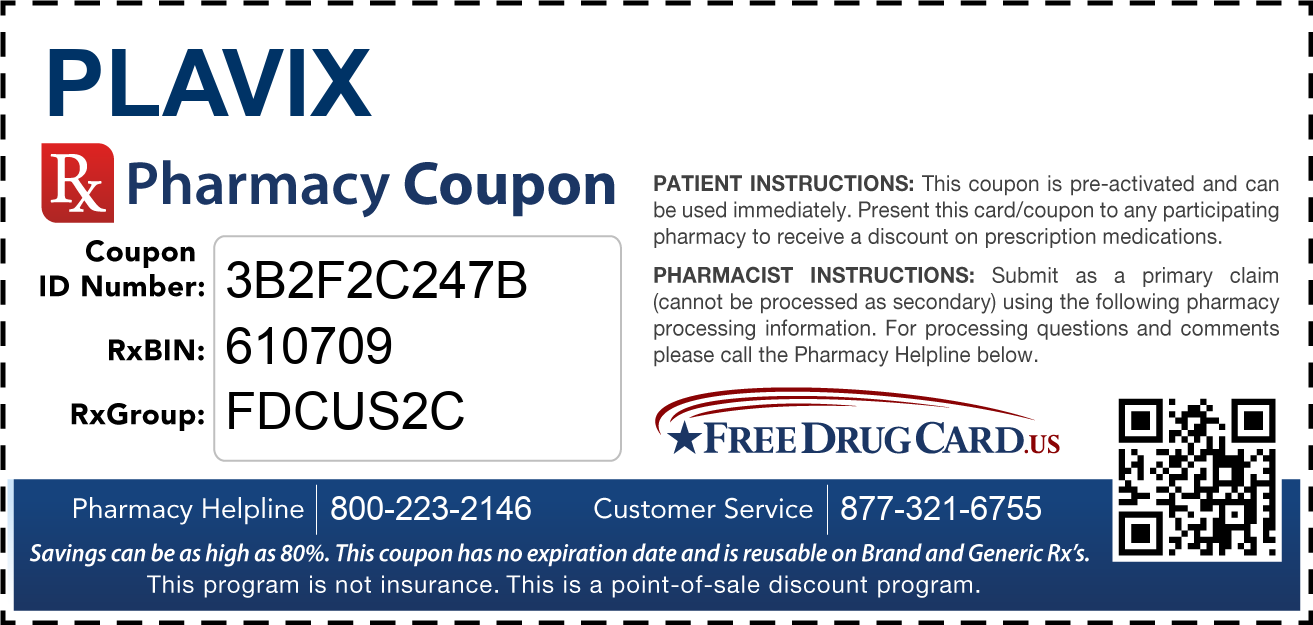Free Plavix Discount Coupon
Print your free Plavix coupon below and bring it into any of our 68,000 participating pharmacies including: Walgreens, CVS Pharmacy, Walmart Pharmacy, Rite Aid, Kroger, Kmart Pharmacy, and Safeway. This Plavix coupon can help you save up to 90% on your medication costs! This pharmacy coupon is pre-activated, can be used immediately, and has no membership fees. Our Patient Assistance Program is completely free and open to everyone.

Send this coupon as a text message to your cell phone:
Before you text your coupon, Like us on Facebook!
Send this coupon as an email to your friends and family:
Before you email your coupon, Like us on Facebook!
STEP 1: Print or save your free drug coupon.
STEP 2: Bring it to your local pharmacy.
STEP 3: Save up to 90% on your prescriptions!
Plavix Drug Information
- Why
- How
- Other Uses
- Precautions
- Special Dietary
- If I Forget
- Side Effects
- Storage Conditions
- Overdose
- Other Information
- Brand Names
Why is this medication prescribed?
Clopidogrel is used to prevent strokes and heart attacks in patients at risk for these problems. Clopidogrel is in a class of medications called antiplatelet drugs. It works by helping to prevent harmful blood clots that may cause heart attacks or strokes.
How should this medicine be used?
Clopidogrel comes as a tablet to take by mouth. It is usually taken once a day with or without food. Try to take clopidogrel at around the same time every day. Follow the directions on your prescription label carefully, and ask your doctor or pharmacist to explain any part you do not understand. Take clopidogrel exactly as directed. Do not take more or less of it or take it more often than prescribed by your doctor.
Clopidogrel will help prevent heart attacks and strokes only as long as you take the medication. Continue to take clopidogrel even if you feel well. Do not stop taking clopidogrel without talking to your doctor.
Other uses for this medicine
Clopidogrel is also sometimes used to prevent blood clots in people with mitral valve disease (a condition that affects the valve that separates the left upper and lower chambers of the heart) prosthetic (artificial) heart valves, and people undergoing certain heart procedures such as coronary artery stent placement. Talk to your doctor about the possible risks of using this medication for your condition.
This medication may be prescribed for other uses; ask your doctor or pharmacist for more information.
What special precautions should I follow?
Before taking clopidogrel,
- tell your doctor and pharmacist if you are allergic to clopidogrel or any other medications.
- tell your doctor and pharmacist what prescription and nonprescription medications, vitamins, nutritional supplements, and herbal products you are taking or plan to take. Be sure to mention any of the following: anticoagulants ('blood thinners') such as warfarin (Coumadin); certain antifungals such as fluconazole (Diflucan), ketoconazole (Nizoral), and voriconazole (Vfend); aspirin and other nonsteroidal anti-inflammatory drugs (NSAIDs) such as felbamate (Felbatol), ibuprofen (Advil, Motrin), and naproxen (Aleve, Naprosyn); fluvastatin (Lescol); cimetidine (Tagamet); etravirine (Intelence); fluoxetine (Prozac); fluvoxamine (Luvox); phenytoin (Dilantin); proton pump inhibitors (PPIs) such as esomeprazole (Nexium) and omeprazole (Prilosec, Prilosec OTC, Zegerid); tamoxifen (Nolvadex); ticlopidine (Ticlid); tolbutamide; and torsemide (Demadex). Your doctor may need to change the doses of your medications or monitor you carefully for side effects.
- tell your doctor if you have bleeding ulcers (sores in the lining of the stomach or small intestine that are bleeding), bleeding in the brain, or any other condition that causes severe bleeding. Your doctor may tell you that you should not take clopidogrel.
- tell your doctor if you have recently been injured and if you have or have ever had liver or kidney disease or any condition that may cause bleeding, including stomach problems such as ulcers and certain eye problems.
- tell your doctor if you are pregnant, plan to become pregnant, or are breast-feeding. If you become pregnant while taking clopidogrel, call your doctor.
- if you are having surgery, including dental surgery, tell the doctor or dentist that you are taking clopidogrel.
- you should know that you may bleed more easily or for a longer time than usual while you are taking clopidogrel. Be careful not to cut or hurt yourself while you are taking clopidogrel.
What special dietary instructions should I follow?
Unless your doctor tells you otherwise, continue your normal diet.
What should I do if I forget a dose?
Take the missed dose as soon as you remember it. However, if it is almost time for the next dose, skip the missed dose and continue your regular dosing schedule. Do not take a double dose to make up for a missed one.
What side effects can this medication cause?
Clopidogrel may cause side effects. Tell your doctor if any of these symptoms are severe or do not go away:
- excessive tiredness
- headache
- dizziness
- nausea
- stomach pain
- diarrhea
- nosebleed
Some side effects can be serious. If you experience any of the following symptoms, call your doctor immediately:
- hives
- rash
- itching
- difficulty breathing or swallowing
- swelling of the face, throat, tongue, lips, eyes, hands, feet, ankles, or lower legs
- hoarseness
- black and tarry stools
- red blood in stools
- bloody vomit
- vomit that looks like coffee grounds
- unusual bleeding or bruising
- slow or difficult speech
- weakness or numbness of an arm or a leg
- vision loss
- fever
- shortness of breath
- fast heartbeat
- pale skin
- purple patches or bleeding under the skin
- confusion
- yellowing of the skin or eyes
Clopidogrel may cause other side effects. Call your doctor if you have any unusual problems while taking this medication.
If you experience a serious side effect, you or your doctor may send a report to the Food and Drug Administration's (FDA) MedWatch Adverse Event Reporting program online [at http://www.fda.gov/Safety/MedWatch] or by phone [1-800-332-1088].
What storage conditions are needed for this medicine?
Keep this medication in the container it came in, tightly closed, and out of reach of children. Store it at room temperature and away from excess heat and moisture (not in the bathroom). Throw away any medication that is outdated or no longer needed. Talk to your pharmacist about the proper disposal of your medication.
In case of emergency/overdose
In case of overdose, call your local poison control center at 1-800-222-1222. If the victim has collapsed or is not breathing, call local emergency services at 911.
What other information should I know?
Keep all appointments with your doctor and the laboratory. Your doctor may order certain lab tests to check your body's response to clopidogrel.
Do not let anyone else take your medication. Ask your pharmacist any questions you have about refilling your prescription.
It is important for you to keep a written list of all of the prescription and nonprescription (over-the-counter) medicines you are taking, as well as any products such as vitamins, minerals, or other dietary supplements. You should bring this list with you each time you visit a doctor or if you are admitted to a hospital. It is also important information to carry with you in case of emergencies.
Brand Names
- Plavix®
FreeDrugCard.us is a proud supporter of Children's Miracle Network

A donation will be made to your local CMN hospital each time a prescription is processed using this prescription coupon.
This Coupon is Good for the Following Heart & Cholesterol Prescriptions:
Plavix
- PLAVIX TAB 75MG
- PLAVIX TAB 300MG
































